Happy China's National Day·风雨磨砺迎华诞,赓续奋斗再扬帆!
上传时间: 2023-10-02 浏览:0人
庆祝国庆节!
China’s National Day is celebrated on October 1st every year to mark the formation of the People’s Republic of China. It is also known as National Day and National Golden Week. The 7-day holiday from Oct.1st to 7th is called “Golden Week”, during which seas of Chinese people go traveling around the world.
每年的10月1日是中国的国庆节,这一节日是纪念中华人民共和国的成立,也被称为国庆节和国庆黄金周。10月1日至7日为期7天的假期被称为“黄金周”。在此期间,很多中国人选择到世界各地旅游。
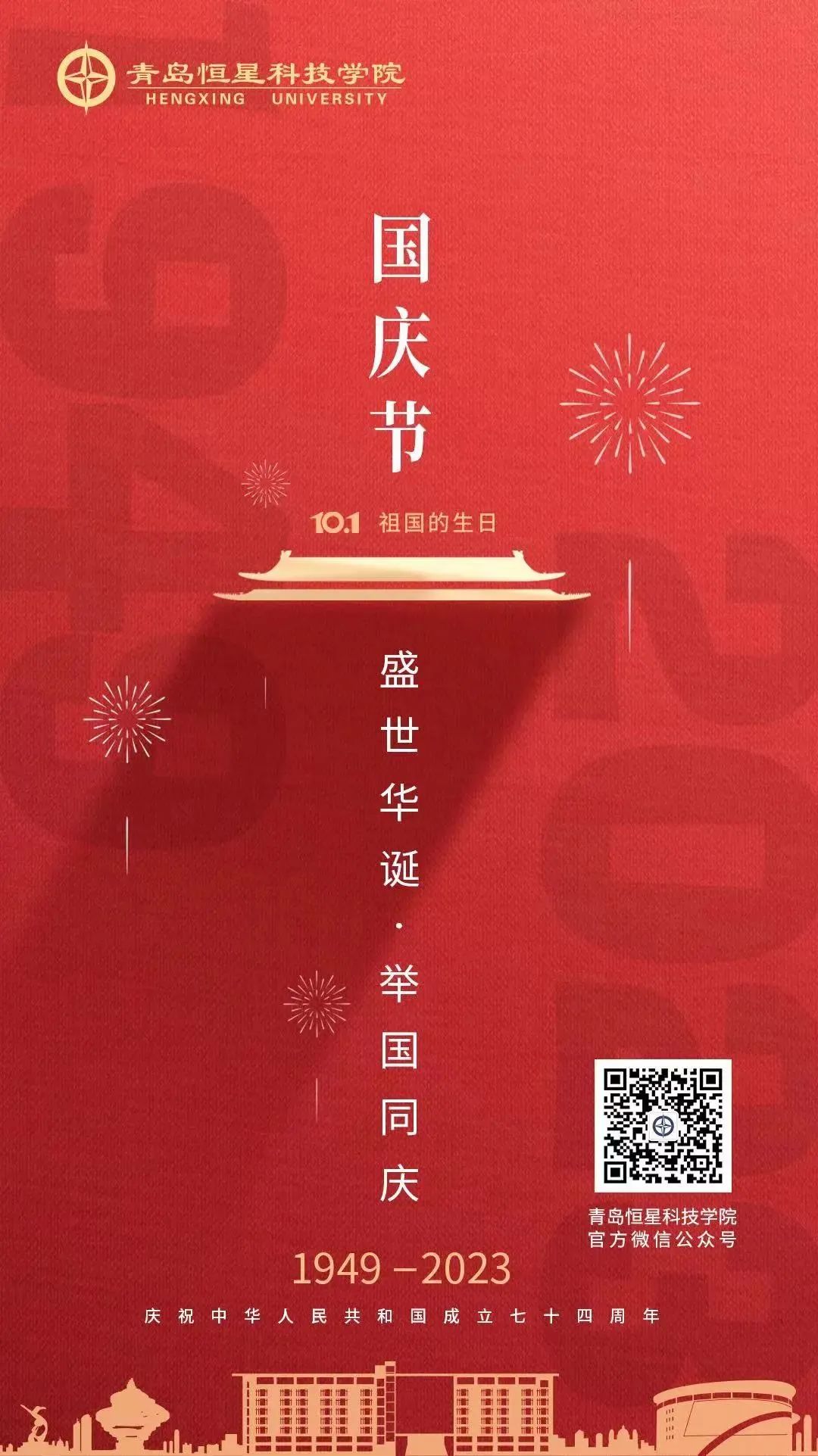
The term “National Day” originally refers to national joyous events of significance, which was first seen in the Western Jin Dynasty. Today, the anniversary of the founding of the country is called the National Day. October 1st is the National Day of our country. Chinese people were fighting courageously for more than 100 years, and obtained the great victory of people's revolution under the leadership of Communist Party of China.
“国庆”一词,本指国家喜庆之事,最早见于西晋。今天,国家建立的纪念日被称为国庆节。10月1日是我国的国庆节,在中国共产党的领导下,中国人民经过一百多年的英勇奋战,赢得了人民革命的伟大胜利。
On October 1,1949, Chairman Mao announced establishment of the People's Republic of China, and declared:“From now on, the Chinese people stand up!”This was the greatest moment, Chinese revolution entered a new period in its history. The first meeting of Chinese People's Political Consultative Conference then decided:Every October 1 is our National Day. Therefrom, every Oct.1 is the holiday for all Chinese peoples to celebrate ceremoniously.
在1949年10月1日,毛主席宣告中华人民共和国成立,并宣布:“中国人民从此站起来了!”这是一个伟大的时刻,中国革命进入了历史新阶段。然后,中国人民政治协商委员会第一次会议规定每年10月1日为国庆日。由此,每年的10月1日就成为全国各族人民隆重庆祝的节日了。
The founding ceremony of New China was held in Tian'anmen Square in Beijing on Oct. 1, 1949.
1949年10月1日,新中国开国大典在北京天安门广场举行。
The Government declared October 1st as National Day every year from 1950 onward. From 1950 to 1959, large celebrations were held every year on National Day, along with military parades (阅兵式).
中央人民政府宣布自1950年起,每年的10月1日即国庆日。在新中国成立初期(1950-1959年),每年的国庆都举行大型庆典活动,同时举行阅兵。
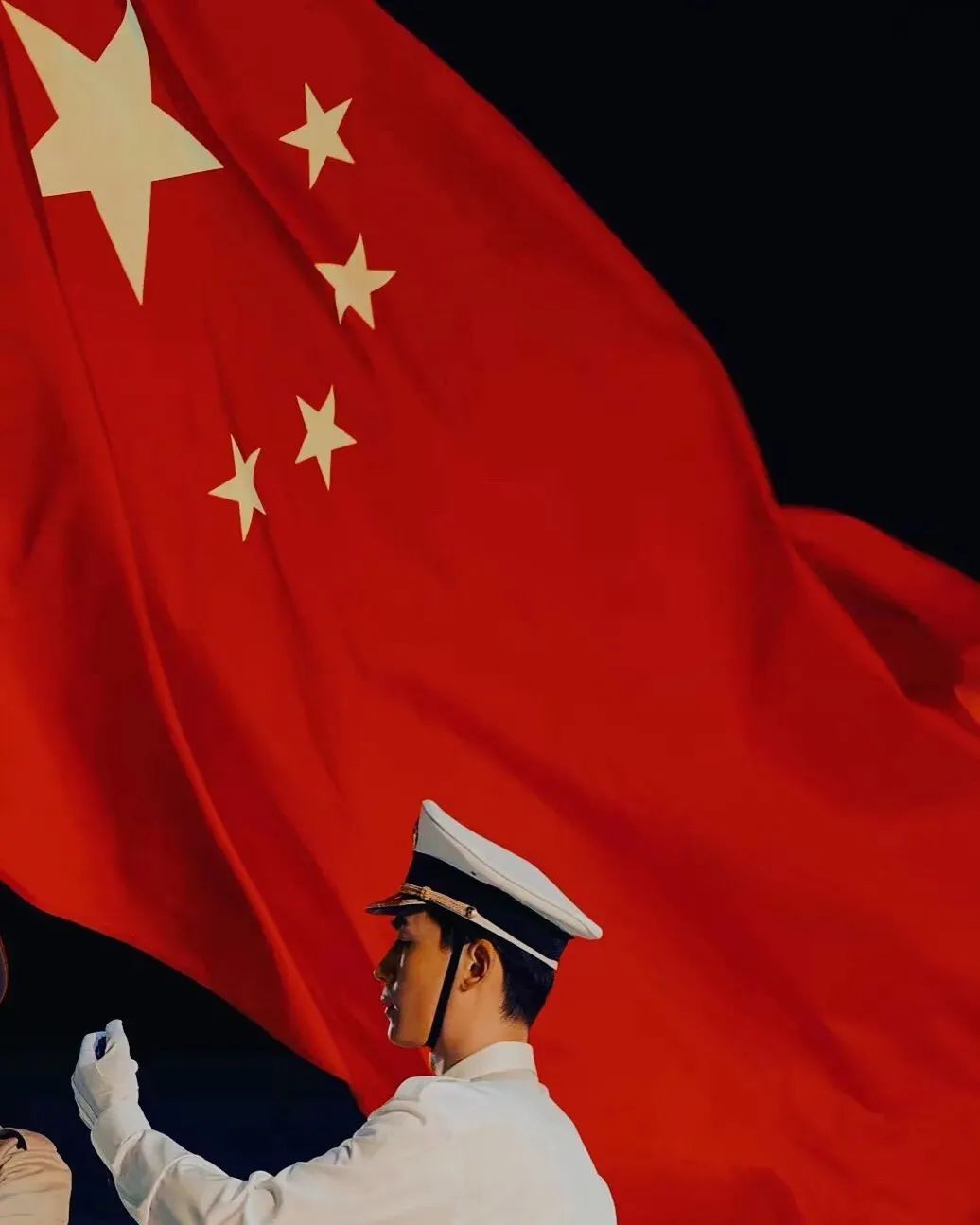
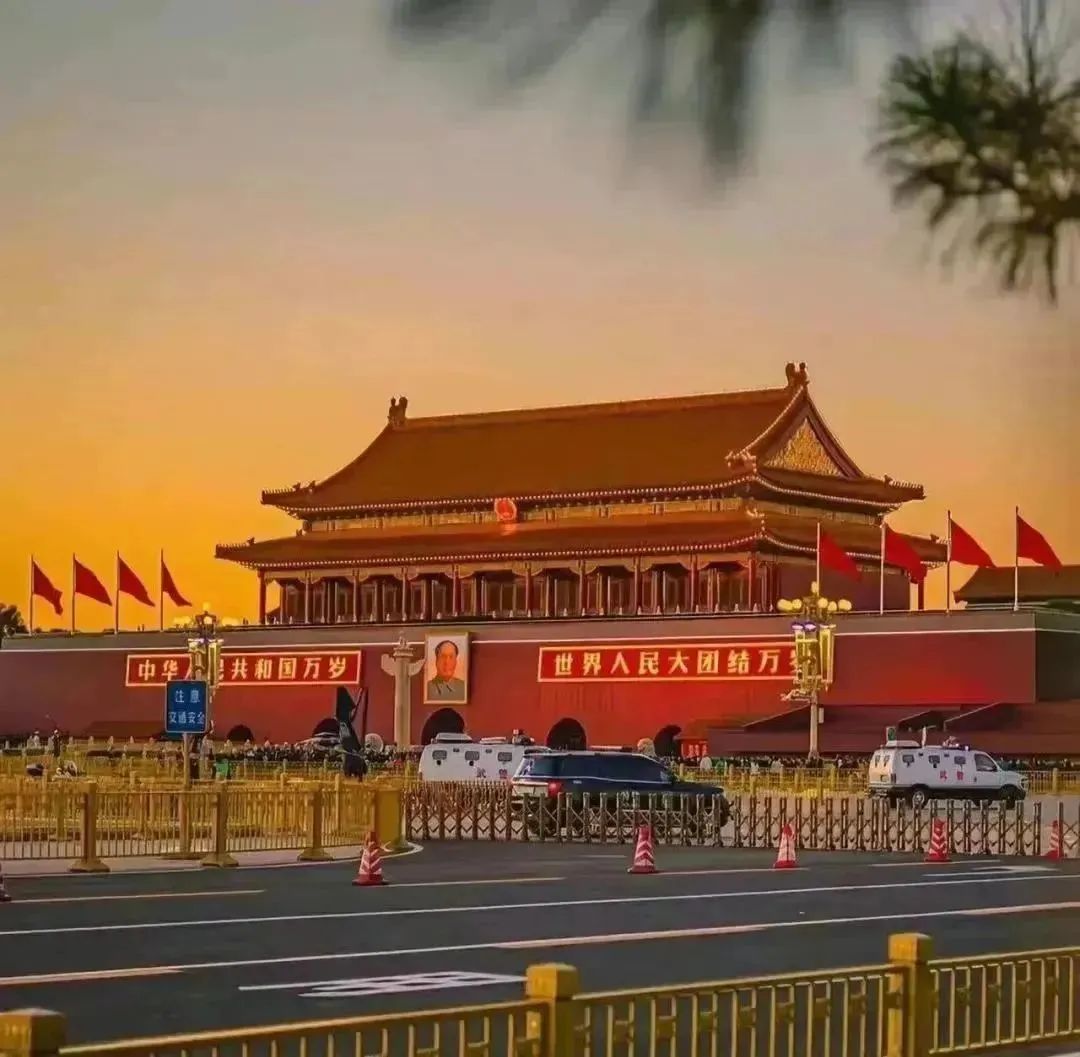
In 1960, based on the principle of diligence and thrift (勤俭节约), National Day celebrations were reformed to “a small celebration in five years, a big one in ten years, and a military parade on every big celebration”.
1960年,中共中央国务院本着勤俭建国的方针,决定改革国庆制度,实行“五年一小庆、十年一大庆,逢大庆举行阅兵”。
From 1960 to 1970, grand rallies (公众集会) and mass processions (一队人) were held in Tian'anmen Square, with no military parade. From 1971 to 1983, China celebrated the National Day only with large-scale park activities and other galas (庆典). In 1984, the 35th anniversary of the National Day, a huge military parade and mass parade were held. Since then, there were three parades held in 1999 (the 50th anniversary of the founding of China), 2009 (60th anniversary), and 2019 (70th anniversary).
自1960年至1970年,每年的国庆均在天安门前举行盛大的集会和群众游行活动,但未举行阅兵。1971年至1983年,每年的国庆节会举行游园联欢和其他庆典活动。1984年,在第35个国庆日上,举行了盛大的国庆阅兵和群众庆祝游行。自此以后,只在1999年(50周年),2009年(60周年),和2019年(70周年)举办了国庆阅兵和游行。
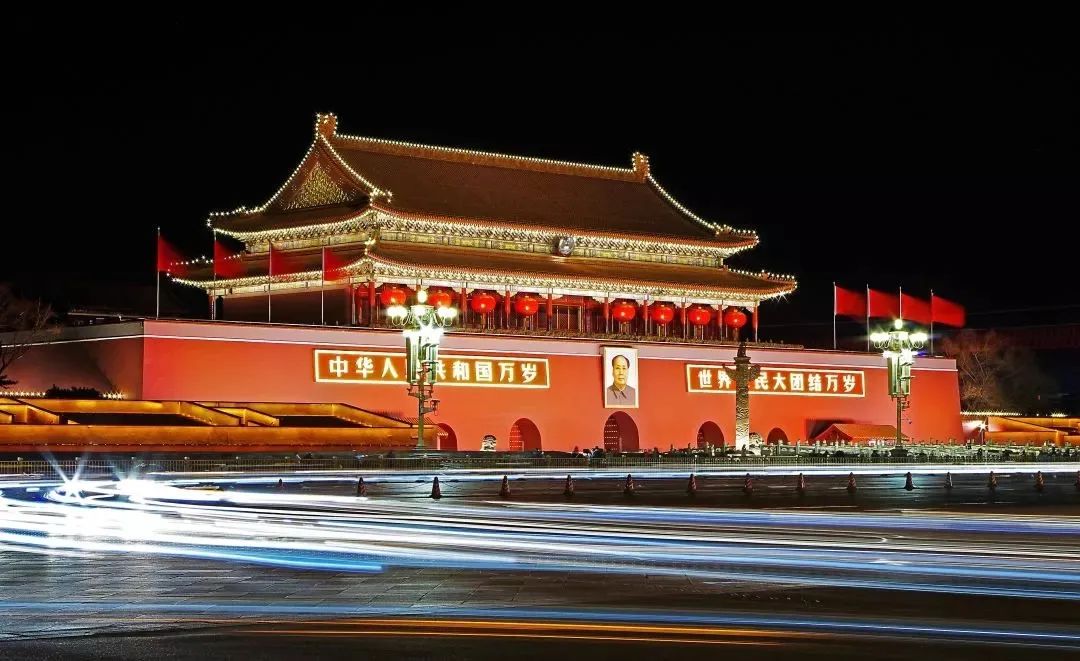
说到“我爱中国”的英文,除了“I love China”,还有:
T恤上常见的爱心印花「I ❤ CHINA」
可以直接读作“I heart China”
另外,“爱国”有一个专用的单词:
Patriotic /ˌpeɪ.triˈɑː.t̬ɪk/ 爱国的
Patriotic fervor 爱国热情
Patriot /ˈpeɪ.tri.ɑːt/ 爱国者
They are very patriotic guys who are willing to give everything for their country.
他们非常爱国,愿为国家奉献一切。
China rocks! 中国真棒!
想称赞祖国繁荣发展,如何用英语表达“超赞”?
China is awesome. 中国真棒。
China rocks. 中国超赞!
这里的rock是动词,直接接在主语后面即可“you rock!”
以下形容词也很适合赞美祖国:
China is magnificent. 中国宏伟壮丽。
China is vibrant. 中国生气勃勃。
China is dynamic. 中国充满活力。
Chinese people & food 中国人&美食
很多外国朋友热爱中国的重要原因:中国人和中国美食!
Chinese people are friendly and hospitable. 中国人友好好客。
Chinese food is exquisite. 中国美食非常精致。
Chinese culture 中国文化
还有很多外国朋友喜欢中国的原因之一就是中国灿烂悠久的历史文化。
Chinese culture is rich and diverse. 中国文化丰富多彩。
China has 5000 years of glorious history. 中国有五千年的辉煌历史。
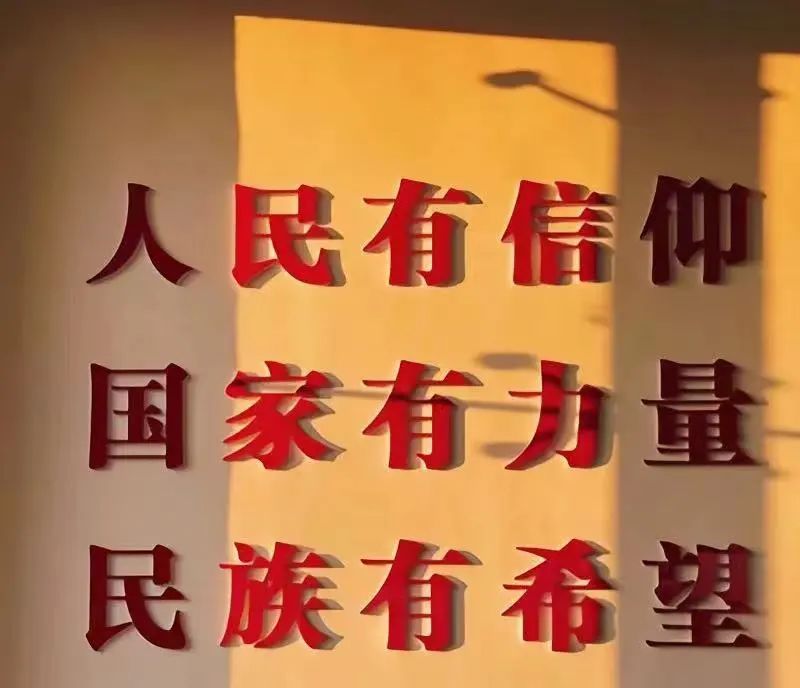
每年的10月1日是中国的国庆节,这一节日是纪念中华人民共和国的成立,也被称为国庆节和国庆黄金周。10月1日至7日为期7天的假期被称为“黄金周”。在此期间,很多中国人选择到世界各地旅游。

The term “National Day” originally refers to national joyous events of significance, which was first seen in the Western Jin Dynasty. Today, the anniversary of the founding of the country is called the National Day. October 1st is the National Day of our country. Chinese people were fighting courageously for more than 100 years, and obtained the great victory of people's revolution under the leadership of Communist Party of China.
“国庆”一词,本指国家喜庆之事,最早见于西晋。今天,国家建立的纪念日被称为国庆节。10月1日是我国的国庆节,在中国共产党的领导下,中国人民经过一百多年的英勇奋战,赢得了人民革命的伟大胜利。
On October 1,1949, Chairman Mao announced establishment of the People's Republic of China, and declared:“From now on, the Chinese people stand up!”This was the greatest moment, Chinese revolution entered a new period in its history. The first meeting of Chinese People's Political Consultative Conference then decided:Every October 1 is our National Day. Therefrom, every Oct.1 is the holiday for all Chinese peoples to celebrate ceremoniously.
在1949年10月1日,毛主席宣告中华人民共和国成立,并宣布:“中国人民从此站起来了!”这是一个伟大的时刻,中国革命进入了历史新阶段。然后,中国人民政治协商委员会第一次会议规定每年10月1日为国庆日。由此,每年的10月1日就成为全国各族人民隆重庆祝的节日了。
The founding ceremony of New China was held in Tian'anmen Square in Beijing on Oct. 1, 1949.
1949年10月1日,新中国开国大典在北京天安门广场举行。
The Government declared October 1st as National Day every year from 1950 onward. From 1950 to 1959, large celebrations were held every year on National Day, along with military parades (阅兵式).
中央人民政府宣布自1950年起,每年的10月1日即国庆日。在新中国成立初期(1950-1959年),每年的国庆都举行大型庆典活动,同时举行阅兵。


In 1960, based on the principle of diligence and thrift (勤俭节约), National Day celebrations were reformed to “a small celebration in five years, a big one in ten years, and a military parade on every big celebration”.
1960年,中共中央国务院本着勤俭建国的方针,决定改革国庆制度,实行“五年一小庆、十年一大庆,逢大庆举行阅兵”。
From 1960 to 1970, grand rallies (公众集会) and mass processions (一队人) were held in Tian'anmen Square, with no military parade. From 1971 to 1983, China celebrated the National Day only with large-scale park activities and other galas (庆典). In 1984, the 35th anniversary of the National Day, a huge military parade and mass parade were held. Since then, there were three parades held in 1999 (the 50th anniversary of the founding of China), 2009 (60th anniversary), and 2019 (70th anniversary).
自1960年至1970年,每年的国庆均在天安门前举行盛大的集会和群众游行活动,但未举行阅兵。1971年至1983年,每年的国庆节会举行游园联欢和其他庆典活动。1984年,在第35个国庆日上,举行了盛大的国庆阅兵和群众庆祝游行。自此以后,只在1999年(50周年),2009年(60周年),和2019年(70周年)举办了国庆阅兵和游行。

说到“我爱中国”的英文,除了“I love China”,还有:
T恤上常见的爱心印花「I ❤ CHINA」
可以直接读作“I heart China”
另外,“爱国”有一个专用的单词:
Patriotic /ˌpeɪ.triˈɑː.t̬ɪk/ 爱国的
Patriotic fervor 爱国热情
Patriot /ˈpeɪ.tri.ɑːt/ 爱国者
They are very patriotic guys who are willing to give everything for their country.
他们非常爱国,愿为国家奉献一切。
China rocks! 中国真棒!
想称赞祖国繁荣发展,如何用英语表达“超赞”?
China is awesome. 中国真棒。
China rocks. 中国超赞!
这里的rock是动词,直接接在主语后面即可“you rock!”
以下形容词也很适合赞美祖国:
China is magnificent. 中国宏伟壮丽。
China is vibrant. 中国生气勃勃。
China is dynamic. 中国充满活力。
Chinese people & food 中国人&美食
很多外国朋友热爱中国的重要原因:中国人和中国美食!
Chinese people are friendly and hospitable. 中国人友好好客。
Chinese food is exquisite. 中国美食非常精致。
Chinese culture 中国文化
还有很多外国朋友喜欢中国的原因之一就是中国灿烂悠久的历史文化。
Chinese culture is rich and diverse. 中国文化丰富多彩。
China has 5000 years of glorious history. 中国有五千年的辉煌历史。

风雨砥砺,岁月如歌
74年披荆斩棘,74年风雨兼程
新中国已从“站起”到“富起”
再到“强起”
山河锦绣,国盛家兴
祝贺伟大祖国成立74周年!
祝福伟大祖国更加繁荣昌盛!
- 上一篇: 四六级百科|英语讲好四季中国:24节气说寒露
- 下一篇: 进社区|扬优秀传统,立文化自信
版权所有:青岛恒星科技学院 | 地址:青岛市李沧区九水东路588号 | 电话:0532-86667234 | 鲁公网安备 37021302000023 号 | 备案号:鲁ICP备20007371号-1


